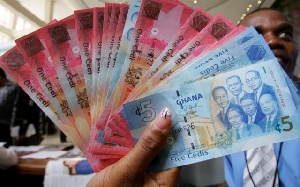Dear Ghanaians,
Many people move heaven and earth to get me. Some even kill and fraud just to have me in their pockets, wallets and purse. I make the sad happy, the poor rich and the hopeless hopeful. I retain the power to make the right wrong yet I`m handled anyhow. I’m called differently in every language all over the world. Guess you wonder who I am? In the English language I`m money; in Ga ‘shika’, in Hausa ‘kudi, in Twi ‘Sika’’. What am I called in your language?
The Birth of the Cedi
Undoubtedly, our currency has evolved over the years. Let’s take a walk down memory lane on the evolution of the cedi. Prior to independence, the issue of currency was the responsibility of the West African Currency Board (WACB). The West African pounds, shillings and pence, constituted currency issued by the Board and was in circulation in Ghana until July 1958. After Independence, the new monetary authority, the Bank of Ghana, issued its own currency in the form of Ghana pounds, shillings and pence on 14th July, 1958. With that issue, the Bank of Ghana formally took over the issue of currency notes and coins from the WACB.
The second issue of currency was in early 1965, when Ghana decided to leave the British colonial monetary system and adopt the widely accepted decimal system. Accordingly, Cedi notes and Pesewa coins were introduced on the 19th July, 1965 to replace the Ghana pounds, shillings and pence. The cedi was equivalent to eight shillings and four pence (8s 4d) and bore the portrait of the then President, Dr. Kwame Nkrumah. The name “cedi” was derived from the word “sedie” meaning cowrie, a shell money which gained popularity and wider circulation in the later part of the 19th Century. The “Pesewa” represented the smallest denomination (quantity) of the gold-dust currency regime. The name was chosen to replace the British Colonial penny.
Sad Revelations
Over time, the Ghana cedi note has been losing its attractiveness among other currencies in Africa and the world at large. The once pride of Ghana is now a laughing stock. A walk through the capital, Accra, revealed some sad imagery on how our currency is handled. There, you will see educated people, market women and men, adults and children crumbling the cedi notes as a way of keeping the money safe from getting missing or torn without anyone penalizing them. Would they do this to the US dollar? Or the Great Britain pound?
Sadly, this phenomenon is prevalent in our churches too. Congregants crumble their offerings just so the next person sitting next to them wouldn’t be able to know the amount they are giving. This is not a good practice as it has adverse effects on the cedi notes. We are all culprits!
A visit to the Makola Market revealed that about 70 percent of Ghanaians have no idea or see no reason why they ought to handle the cedi note carefully without soiling it or writing on it. Some actually use it as phonebooks for saving the numbers of people. Shocking! These business men and women assert that the only idea they have about the cedi is that when the notes get worn out you can take it to the bank for replacement. They said the note will be changed for you when you take it to the bank. Adding that, the cedi notes are made of paper even when you keep it clean, it will definitely tear and wear-off.
According to them they have never had any education on how to keep the cedi notes not even on the television or radio. Some of these traders who are the main culprits blamed food vendors and those who deal with consumable items like cooking oil, fish and charcoal sellers among others.
Speaking casually to some drivers and their mates in a series of public vehicles, they squarely put the blame on other Ghanaians instead of themselves. According to them some Ghanaians are very dirty that they cannot handle their own money clean so they do not respect the cedi note that come their way and end up soiling it with either oil or crumble it. One driver said the way and manner Ghanaians handle our cedi note in the country is very bad. “You see a well-dressed man or woman paying his or her fare with a dirty and torn note and when you refuse to accept it they rain insults on you and direct you on what to use the money for”. Ironically, these same drivers and mates fold cedi notes into two equal parts and often soil them with engine oil and grease.
A charcoal seller, who received money from a buyer with her charcoal soil hand, crumbled it before putting it in her pocket. Speaking to her, she explained that customers are always in a hurry to receive their items and balance so she had to quickly handle the cedi in that manner. She added that, when she gets home she straightens them up and takes it back to the bank or use it for her business. Is this a good reason to mis-handle the cedi note?
Way forward
Professor Peter Quartey, an Economic Expert from Institute of Statistical, Social and Economic Research, provides simple ways to handle the cedi note. He advocates for banks to partner with the National Commission for Civic Education to educate Ghanaians, especially the market men and women and those in the village with different languages that will enable them understand how to handle the cedi note. He explained that the handling of the cedi note is a big challenge in the country and hardly do you hear banks and financial institutions discuss it.
He urged financial institutions to provide bags for their consumers, especially, business people who use the cedi note to work to keep their money at a safer place. He encouraged the use of wallet and purse by all and sundry. Finally, Professor Peter Quartey said laws should be enforced to penalize people who publicly mishandle the cedi to serve as a deterrent for others to learn from. I am what provides the food, clothing and shelter you need. I bring joy and take away sadness. Handle me with care, the way you handle your babies.
Your Pride,
The Ghanaian cedi.
By: Shadrack N.Y Yartey
Opinions of Friday, 2 March 2018
Columnist: Shadrack N.Y Yartey















